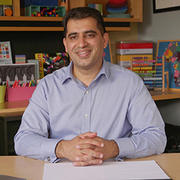
Negotiation at community, regional, and national levels is key to solving health issues that cross borders, said Abdul Tawab Saljuqi, MD, MPH, the former director of the health promotion department at the Ministry of Public Health in Afghanistan. Dr. Saljuqi, who is currently completing his DrPH in public health policy and management at the Mel and Enid Zuckerman College of Public Health at the University of Arizona, gestured to a colorful diagram on the nearby flipchart that depicted key aspects of a polio prevention effort on the Afghanistan-Pakistan border. For this physician with expertise in health communications, thinking visually about his past work came easily.
In late June the Incubator welcomed Dr. Saljuqi for a week-long faculty immersion residency. As a part of Dr. Saljuqi’s professional development, he worked with Incubator staff—including GHELI interns Tyler Fox and Nico Yamin—and participated in a visual drawing workshop with Nina Bhattacharya, GHELI’s Instructional Design Specialist and with Jake Waxman, Multimodal Instructional Designer at the Center for Health Decision Science, to translate his ideas from storyboard to studio.
A storyboarding workshop is an essential ingredient when developing the Incubator’s educational products, allowing participants to get accustomed to the space and the process of filming. During the storyboarding workshop, Incubator staff helped Dr. Saljuqi curate the critical narrative junctures of his story, which blended meaningful evidence and personal experience. Dr. Saljuqi sketched out the outline of his case study scene-by-scene, testing and refining his ideas with GHELI staff.
Outline in hand, Dr. Saljuqi was introduced to the Incubator main studio with a brief orientation to the cameras and the filming process by Multimedia Administrative Coordinator
Camilla Finlay. Dr. Saljuqi—a natural in front of the camera—then began a practice run-through.
The goal of Saljuqi’s studio exercise was to develop a prototype media narrative about polio that illuminated the strengths and challenges of health care delivery in conflict settings. Ultimately, the new case study will contribute to a collaboration between Saljuqi and the Incubator to develop educational materials around immunization challenges in the Afghanistan context, with a particular focus on the complexities of polio eradication through a lens of health diplomacy and collaborative governance.
With characteristic humility, Dr. Saljuqi was quick to acknowledge how his collaborations on polio eradication and health diplomacy—with faculty and students at the Mel and Enid Zuckerman College of Public Health at University of Arizona and a training package developed as a part of a workshop on collaborative governance at the School of Government and Public Policy at the University of Arizona—positioned him to leverage the professional development opportunities at GHELI.
“The studio is a unique place that allows our collaborators a safe environment in which to reflect, curate, experiment, create, and grow as they translate their diverse knowledge and skills into a media product that speaks to a broad audience,” remarked Incubator Faculty Director Sue J. Goldie. “I’m so pleased to have had the privilege to work Tawab over the past many years, and to host him here at the Incubator. His perspective and expertise enrich our work tremendously, and we’re delighted to collaborate with him as he develops these important educational pieces.”
